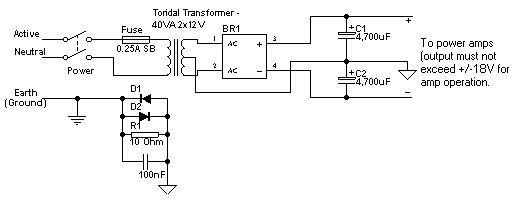Hi all, I'm working on a project that includes a three channel power amp to drive my front pair plus a centre channel that can be used for home theatre sound. The rear channels of my 5.1 setup have their own discrete amp at the back of the room.I have three modified quad 405-II boards where among other things signal ground is no longer connected to the heatsink, three separate power supply boards sourced here and identical to: http://dl.dropbox.com/u/4130965/PSU.pdf and three 330VA dual secondary + centre toroidal transformers.The whole amp will be built into a single box (I might separate the toroidals out into a separate box) which in turn will be hidden in a piece of furniture (heatsink protruding).The question is what my options are with ground. As I have three centre taps, it's tempting to try to keep them fully independent as far as possible, connected only at the preamp, but I'm not sure if this is possible in practice. Chassis will be grounded to mains earth.
 displays the ground connection of a TDA2030 amplifier. Is this something I could use (one such ground connection for each channel)?Many thanks for your input.Cheers!Marius
displays the ground connection of a TDA2030 amplifier. Is this something I could use (one such ground connection for each channel)?Many thanks for your input.Cheers!Marius



